Indians in Tanzania
There are currently over 60,000 people of Indian origin in Tanzania. Many of them are traders and they control a sizeable portion of the Tanzanian economy. Indians have a long history in Tanzania starting with the arrival of Gujarati traders. They came to gradually control the trade in Zanzibar. Many of the buildings constructed then still remain in Stone Town, the focal trading point on the island.
Watanzania wenye asili ya Kihindi (Swahili) | |
|---|---|
| Total population | |
| c. 60,000 (2015)[1][a] | |
| Regions with significant populations | |
| Dar es Salaam, Zanzibar | |
| Languages | |
| Odia,[2] Punjabi, Sindhi, Gujarati, Telugu, Tamil, Kutchi, Kiswahili, English, Hindi | |
| Religion | |
| Islam, Hinduism, Zoroastrianism, Sikhism; significant minorities Christianity | |
| Related ethnic groups | |
| PIO, NRI and Desi | |
a.^ includes about 10,000 expatriates |

History
Indian merchant and artisan community settlements is attested in both archaeological and literary sources. In 13th-14th century, Indian artisans were manufacturing glass beads using tube drawing technology at Zanzibar. Trade between Malindi and Bengal is also attested during early medieval periods. Vasco da Gama when he landed in east african coast found indians residing in Kilwa, Mombasa and Mozambique.[3][4]
Migration from Tanzania
As a result of anti-Indian sentiment in post-independence Tanzania (beginning with the presidency of Julius Nyerere), many Indians migrated overseas to India, Pakistan, the United Kingdom, the United States, and Canada, among other nations.[5]
Notable people
- Freddie Mercury, rock musician (of Parsi descent)
- Amir H. Jamal, former Minister of Finance
- Al Noor Kassum, former Energy Minister
- Andy Chande, businessman and philanthropist
- Mustafa Jaffer Sabodo, economist and philanthropist
- Shamim Khan, former Member of Parliament
- Ian Iqbal Rashid, filmmaker
- Sangita Myska, BBC journalist, documentary maker, TV & Radio presenter
- Mohammed Dewji, CEO of MeTL, Member of Parliament (2005–2015)
- Ismail Jussa, opposition politician
- Mohamed Raza, Member of the Zanzibar House of Representatives
- Issa G. Shivji, author and academic
- Abdul Sheriff, historian
- Richa Adhia, Miss Tanzania 2007
- Mustafa Hassanali, fashion designer
- Ally Rehmtullah, fashion designer
- Ammaar Ghadiyali, 2012 Olympic swimmer
- Deepak Obhrai PC MP, longest continuously-serving Conservative Member of Canadian Parliament
- Rakesh Rajani, civil society and global development leader
- Raheem Kassam, conservative British political activist. His parents were Tanzanian immigrants of Indian origin.
- Rishi Sunak, Prime Minister of the United Kingdom
Gallery
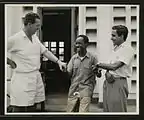 Julius Nyerere with Amir Jamal (r)
Julius Nyerere with Amir Jamal (r) St. John Ambulance Brigade parade
St. John Ambulance Brigade parade Karimjee Hall, seat of the parliament in Dar es Salaam
Karimjee Hall, seat of the parliament in Dar es Salaam The Hassanali Karimjee Jivanjee Hospital, Zanzibar
The Hassanali Karimjee Jivanjee Hospital, Zanzibar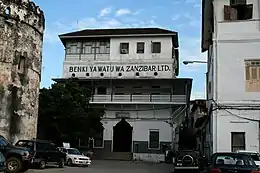 The former headquarters of Karimjee Co in Zanzibar
The former headquarters of Karimjee Co in Zanzibar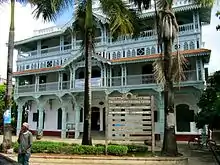 The former Ithnashiri Dispensary, Zanzibar
The former Ithnashiri Dispensary, Zanzibar.jpg.webp) Bharmal Building, currently used as a municipal building
Bharmal Building, currently used as a municipal building A colonial era building with the Om symbol (1930)
A colonial era building with the Om symbol (1930) Karimjee Jivanjee Office in Dar es Salaam
Karimjee Jivanjee Office in Dar es Salaam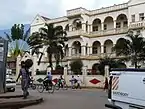 Morogoro Jamatkhana
Morogoro Jamatkhana Shakti Temple, Zanzibar
Shakti Temple, Zanzibar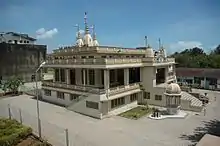 Swaminarayan Temple
Swaminarayan Temple
See also
References
- "India - Tanzania Relations" (PDF). Ministry of External Affairs. 2015. Retrieved 22 July 2015.
Tanzania has about 60,000 PIOs.. There are about 10,000 Indian nationals [expatriates].
- "Celebration of Utkal Dibas (2nd April 2022)". hcindiatz.gov.in. Retrieved 29 March 2023.
- Wood, Marilee (2012). "Interconnections: glass beads and trade in southern and eastern Africa and the Indian Ocean - 7th to 16th centuries AD". Azania: Archaeological Research in Africa. 47 (2): 248. doi:10.1080/0067270X.2012.680307. ISSN 0067-270X. S2CID 162211326.
- Jeevanjee 1912
- Adam, Michel, ed. (2016). Indian Africa : minorities of Indian-Pakistani origin in eastern Africa. ISBN 978-9987-753-51-2. OCLC 966879871.